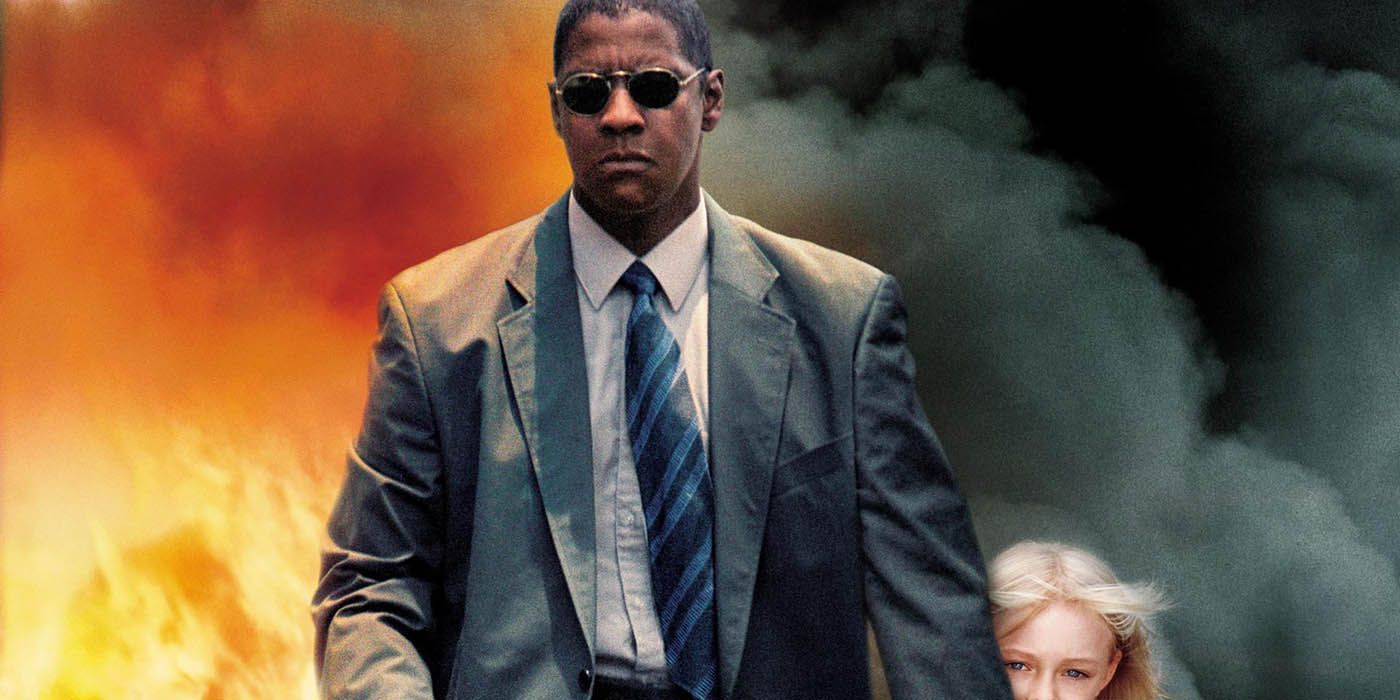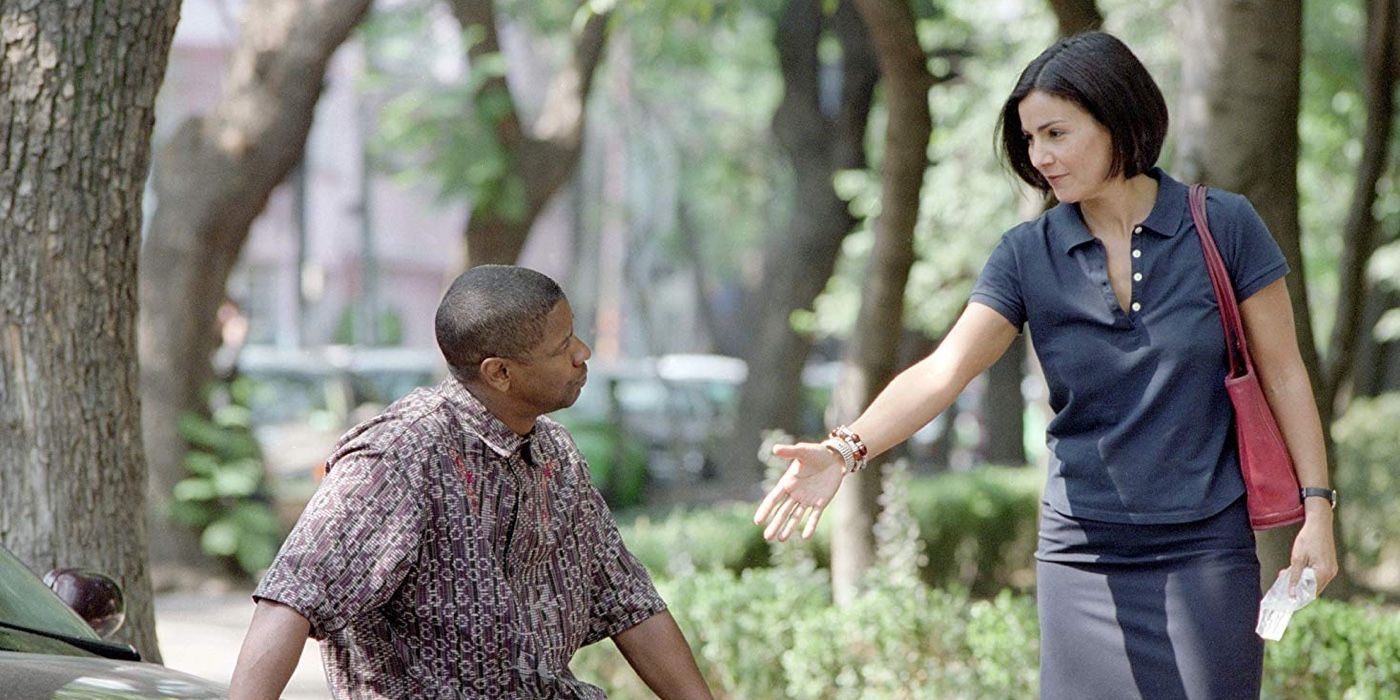A dark, morbid and depressing movie that will leave you feeling unsatisfied and, for lack of a better term, icky.
Man on Fire is actually the second film adaptation of the novel by A.J. Quinnell. (The first was an obscure 1987 film of the same name, starring Scott Glenn.) Although this adaptation of the movie doesn't make it crystal clear, the title stems from the concept of "a man on fire doesn't just burn; he explodes." Since it was directed by Tony Scott, you already know that the story will take a back seat to "high concept" stylized action and violence. Scott seems to suffer from the same addiction to hyper-editing and "Richter scale" camera work as his older brother and business partner, director Ridley Scott. (At several points in the movie, I was wondering if an earthquake was taking place during the scene.) The cast has several standouts, but even they can't save the movie from Scott's weak direction and a very heavy-handed script by Brian Helgeland that practically screams "the ends justify the means."
Denzel Washington stars as John Creasy, a former government operative and soldier of fortune whose career was severely cut short by his alcoholism. Now unemployed and wandering about, he doesn't feel especially proud of what he has done with his life. He visits one of his friends and old colleagues named Rayburn (Christopher Walken), who helps him get a job as a bodyguard in Mexico. (There is a statistic at the beginning of the movie that says, "There is a kidnapping every 60 minutes in Latin America. 70% of the victims do not survive.") Creasy's assignment is Lupita Ramos, the nine-year-old daughter of Samuel Ramos (Marc Anthony -- yes, that Marc Anthony) and Lisa Ramos (Radha Mitchell). Initially, Creasy doesn't get along very well with Pita, as everyone calls her, but since Pita is played by the precociously cute Dakota Fanning, it doesn't take long for the two to become the bestest buddies ever. Before long, Creasy starts to turn his life around and become like a second father to Pita. All together now: Awwww.... Seriously, the first act of this movie is actually quite enjoyable, but the irony is that if the movie had only been about their friendship, people like me never would have watched it. The far less enjoyable Act Two unofficially begins with a shootout that leaves Creasy barely clinging to life and culminates in Pita's kidnapping.
Soon after the kidnapping, the kidnappers contact Pita's parents and demand ten million US dollars. As anyone who has seen formulaic kidnapping movies can guess, the money pick-up goes horribly wrong. The furious kidnappers call Pita's parents and tell them their daughter has been killed. Right around the same time, Creasy regains consciousness. After he hears about Pita's death, he snaps. Cutting his lengthy recovery process drastically short, he enlists the help of Rayburn to get him access to just about every weapon ever invented. (Isn't it convenient how people can always find arms dealers like that in Mexico? Do they advertise in the Yellow Pages or what? This must be the same guy who helped Linda Hamilton arm herself to the teeth in Terminator 2.) At that point, Creasy is -- brace yourself -- a Man on Fire ™. He goes on a murderous rampage, looking for anyone who might have played so much as a tangential role in the kidnapping. With only a few exceptions, everyone who ends up on his bad side has two choices: Tell him what he wants to know and die a quick death, or else die a slow, agonizing death that would feel right at home in a Tarantino movie. Very quickly, it becomes obvious that Creasy isn't stopping until he kills Bill. Oh wait, wrong movie...
If you use just a little imagination, I'm sure you can guess the ending. If you use a little more imagination, you can probably figure out who's behind Pita's kidnapping. For all its faults, the movie has a decent cast. Denzel Washington and Dakota Fanning both do good acting work, and their interaction is very good. Hopefully, Fanning can survive the inevitable "awkward teenage years" phase of her career. Most child stars don't overcome it, especially the ones who fall into the "precociously cute" category, like she does. Other impressive acting performances include Christopher Walken, who plays a surprisingly subdued (for him) character, and Mickey Rourke, who has a small role as the Ramos family lawyer. Aside from the unsatisfying ending, I was struck by how Mexico is portrayed as a hopelessly corrupt country. Sure, Mexico has its fair share of problems, but if you believe this movie, the minute you set foot in Mexico, you should expect to be gunned down, blown up or stabbed to death. Another problem I had with the movie was that little snippets of translations are constantly bombarding various places on the screen, sometimes even when they're speaking English. What happened to just putting completely translated sentences at the bottom of the screen when they're not speaking English, and putting no translations when they are speaking English? Just a thought...
One thing I can't figure out is why 20th Century Fox chose to make this movie (again). Why this one, and why now? My best guess is that the time seemed ripe for a cold-blooded revenge flick, since the government's war on terror has put most of us in that frame of mind. In a way, the movie teaches us the same thing real life does: In the end, there's nothing satisfying about cold-blooded revenge.


